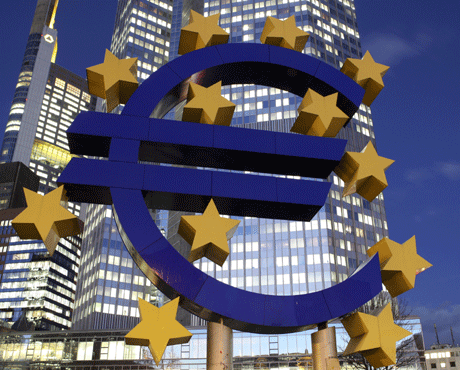UK shuns crisis aid as Europe channels $195 billion to IMF
Updated: 2011-12-21 07:52
(China Daily)
|
|||||||||
|
 The European Central Bank headquarters in Brussels. The three countries drawing on emergeny loans - Greece, Ireland and Portugal - weren't aksed to contributed to the International Monetary Fund. [Hannelore Foerster/Bloomgerg] |
LUXEMBOURG / BRUSSELS - Europe bolstered its anti-crisis arsenal, channeling 150 billion euros ($195 billion) to the International Monetary Fund (IMF) as the European Central Bank (ECB) widened its support for sagging bond markets.
Four countries not using the single currency also
pledged to add to the IMF war chest while Britain refused to commit, in a sign of the difficulty of attracting outside cash to ease the eurozone's homegrown debt burdens.
The United Kingdom will "define its contribution" in early 2012, eurozone finance ministers said in a Brussels statement after a conference call on Monday.
The IMF track is "obviously a small-scale solution", said former UBS AG chairman Peter Kurer. "What really would be needed in the ideal world would be euro bonds or a substitute which can bring large-scale liquidity and confidence into the markets."
Germany continued to oppose an early decision to raise the limit of 500 billion euros on overall emergency aid. European leaders plan to tackle that question by March.
Still, the IMF infusion and a jump in ECB bond purchases indicated that Europe is wielding more money instead of relying on budget cuts alone to persuade investors to return to markets scarred by two years of burgeoning debt and threatened defaults.
Bundesbank demand
Contributions to the Washington-based IMF were controversial inside and outside the 17-nation eurozone.
The most potent central bank among the euro users, Germany's Bundesbank, coupled its 41.5-billion-euro input to a promise that the aid will not be earmarked for Europe.
Such recycling would violate euro rules, inspired by the Bundesbank, that bar central banks from financing government deficits.
As a result, the eurozone will lend to the IMF's general resources, not to a special euro crisis fund.
France, the second-largest eurozone country, will supply 31.4 billion euros, the statement said. Italy will deliver 23.5 billion euros and Spain 14.9 billion euros.
The three countries drawing on emergency loans to escape default - Greece, Ireland and Portugal - weren't asked to contribute, the Greek Finance Ministry said.
Amounts pledged by four EU countries outside the euro - the Czech Republic, Denmark, Poland and Sweden - weren't immediately disclosed.
Ten days after UK Prime Minister David Cameron battled euro leaders over crisis management at a Brussels summit, Britain's wariness of the IMF program sabotaged the eurozone's goal of drumming up 50 billion euros from the rest of the European Union.
UK deferral
"The UK has always been willing to consider further resources for the IMF, but for its global role and as part of a global agreement," the UK Treasury said in an e-mailed statement.
The success of the IMF strategy hinges on how other major powers react.
While talks are under way with China, there is "no chance" that Congress will approve more US money, German Finance Minister Wolfgang Schaeuble said on a German radio station.
"The EU would welcome G20 members and other financially strong IMF members to support the efforts to safeguard global financial stability by contributing to the increase in IMF resources so as to fill global financing gaps," Luxembourg Prime Minister Jean-Claude Juncker, who chaired the conference call, said in the statement.
Bloomberg News











